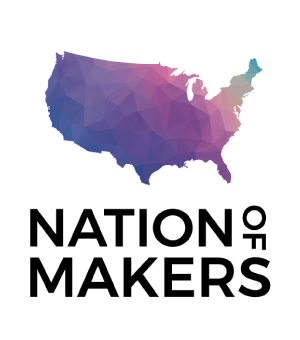Making the Case: EMERGENCY RESPONSE
When the COVID-19 medical supply shortages hit in 2020, makers and small manufacturers stepped up to contribute their time, materials and skills. They used equipment available through makerspaces or in their homes and garages to design, deliver and donate over 34 million units of medical supplies worth an estimated market value of over $163M. This is the maker approach in action.
Using online forums for communication and open source approaches to sharing information and design files, makers worked in collaboration with clinicians to rapidly develop hundreds of designs and even new medical supply products to protect healthcare and essential workers against COVID-19. This “distributed manufacturing” effort resulted in millions of locally-produced medical supplies being distributed in record time—significantly faster than larger-scale, traditional manufacturing—ultimately saving untold numbers of lives.
COVID-19 exposed global supply chains to be vulnerable to disruption and domestic manufacturing to be insufficient to meet our country’s needs during crises. But pandemics are not the only crises we need to consider. Climate change is driving new levels of wildfire seasons and air quality challenges, hurricane and flooding impacts, and is projected to dramatically increase human migration and housing crises. Maker approaches grounded in innovation, human centered design, and rapid prototyping are the disaster response credentials of our new normal.
POLICY OPPORTUNITIES
Formalize the Maker Response Network. As we plan for greater national resilience and future disaster response, designers, prototypers, engineers, makers, local manufacturers, and their facilities should be formalized, supported, and leveraged as a distributed emergency innovation and manufacturing response network. A U.S. Manufacturing and Prototyping Reserve and a companion U.S. Digital Stockpile of designs for emergency and disaster response equipment are two ideas that would support the development of the Maker network and capacity for a response on behalf of national security.
Fund and Incentivize the Maker Response Network. Grant and capital improvement opportunities—especially for makerspaces, the central infrastructure of the Citizen Maker Response—are critical towards ensuring their capacity to respond in the future. Most unaffiliated makerspaces are key centers of learning, innovation, and entrepreneurship in communities, and most exist on the edge of fiscal solvency. Investing in makerspaces will benefit not only evergreen goals of workforce and economic development, but also any future emergency where a rapid innovation and fabrication response is needed.
Facilitate New Distribution and Delivery Pipelines and Guarantee Markets for Local Production. To increase national resilience to medical supply chain disruption, the U.S. Government must offer market subsidies and/or longer-term contracts to domestic manufacturers of PPE to ensure the availability of high-quality and sufficient supply in pandemics and emergencies. This could include a requirement that all PPE for the Strategic National Stockpile is domestically manufactured, similar to the Berry Amendment, and the Buy-American Statute, which promote the purchase of U.S.-made goods for military and federal agencies, respectively. Other federal stockpiles, such as HHS, FEMA, and Veteran Affairs, would benefit from the same requirement, as they were depleted pre-pandemic due to 2018 tariff impositions.
Case Studies
DESIGN | MAKE | PROTECT, a report on the international open source response to the COVID-19 medical supply shortages
DESIGN | MAKE | PROTECT, a report authored by Open Source Medical Supplies and Nation of Makers, documents how the international maker network responded to the COVID-19 medical supply crisis, designing and distributing over 48 Million pieces ($271Million worth) of medical supplies to health care and essential workers in need. This report sheds light on how open source methodologies and the modern, low cost prototyping toolset together generated the fastest and most effective emergency manufacturing response to the most significant supply chain crisis of our time.
Open Works Baltimore / Makers Unite Face Shield Effort
This report tells the story of Makers Unite, a collaborative emergency PPE production project spearheaded by Open Works, a 34,000 square feet makerspace in Baltimore, Maryland. Open Works was able to use institutional trust, community collaboration, and Lean Manufacturing practices to produce and distribute 28,270 face shields in 56 days. This emergency response project created jobs during COVID-19 lockdown, and leveraged a distributed network of 388 volunteers and their 3D printers.
MatterHackers’ Maker Response Hub
Maker Response Hub is a free platform to connect people with idle 3D printers with those who need 3D printed items to help during an emergency. It was started by MatterHackers, the largest U.S. 3D printing retailer, to connect thousands of volunteers with idle 3D printers with medical facilities in need of critical PPE during the COVID-19 pandemic, including face shields, ear savers, and door handles. Between March and May 2020, the Hub grew to over 5,000 volunteers across the USA with 15,000+ idle 3D printers to put to work. Over 75,000 pieces of 3D printed PPE were delivered to 180+ facilities. The Maker Response Hub found success in partnering with other grassroots organizations to provide everything from shipping and logistics, to materials and discounts, to additional printing capacity - ensuring their success on a local level. Maker Response Hub stands at the ready to 3D print models for future emergencies, and to provide localized, philanthropic, on-demand distributed manufacturing wherever it is needed most.



